 When you own your life, you know that the life best lived is one fully lived. That’s why on occasion I’ll post about one of the four main life areas, or what I call the spirit, the heart, the mind, and the body. Today we look at the mind, which treats the intellectual/mental aspect of life as well as culture. I love history, so I often go there to improve my mind. And when it comes to history, nothing beats being in the places where history was made. Seeking out history History is made everywhere. And it’s very much worth knowing if it relates to you. For instance, many of my ancestors lived in Idaho, so knowing more about Idaho’s history can help me know more about them and the heritage I have received from them. And that brings me to the Old Idaho Penitentiary State Historical Site. Visiting the Old Idaho Penn Not that my ancestors were criminals. At least I don’t think they were. But how society treats its derelicts reflects cultural values, and those values influenced the people living then, including my ancestors. The Old Idaho Penitentiary State Historical Site (hereafter called the Old Pen) is only a few miles east of downtown Boise. The facility operated for just over a century (1872-1973) and housed over 13000 inmates, 215 of whom were women. In fact, there was a separate women’s ward built outside the walls of the Old Idaho Pen between 1905 and 1920. Not a single one of these women were executed, although seven had convictions for second-degree murder and one for first-degree murder. That last one was given a life sentence, of which she served only 13 years. Death row 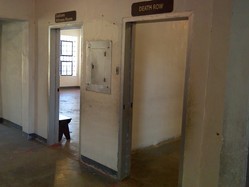 Not so for the men. Ten were executed. A gallows in the yard provided death by hanging until the Maximum Security Building was completed in 1954. And they constructed the hanging room right next to death row. I guess that just minimizes the chances of escape (not that they were that good otherwise).  Witnesses could watch through a glass window while the condemned, bound at both hands and feet, stood on a trap door with a noose placed around his neck.  The other end of the noose is attached securely to this ceiling hook.  The executioner pulls this lever when the final moment comes, and the condemned falls through the trap door.  Underneath the gallows floor is a place called the Drop Room. Here the body was collected and a doctor examined the body to verify death. An adjacent door led outside the building where a car could transport the body to a funeral home for services. 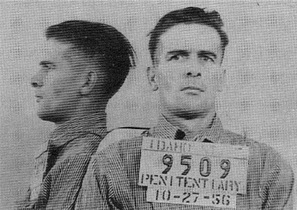 Idaho used this operation only once, just after midnight on 18 October 1957 on Raymond Snowden, also known as “Idaho’s Jack the Ripper.” If you follow the link to learn more about the execution, I warn you that it’s no bedtime story. It may also explain why Snowden was the only one to die here. Later in 1978 then Governor John Evans replaced hanging with lethal injection as Idaho’s method of prisoner execution. A blaze of glory (or not) 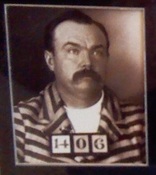 Perhaps the most notorious resident of the Old Idaho Pen was Harry Orchard, who assassinated former Governor Frank Steunenberg in 1905. Steunenberg quelled violence at a northern Idaho mining town in 1899 by declaring martial law and requesting federal troops. Many labor unionists felt betrayed by Steunenberg. Five years after leaving office, Steunenberg died outside his house after a bomb rigged to a side gate exploded.  I've known about the Steunenberg statue in front of the State Capitol for years, but I always thought it was erected because he had some influential reputation as a statesman. Now I see the statue was constructed to memorialize an assassinated governor. I had no idea that Idaho’s history had any assassinations. Looks like I got another rabbit hole to explore. Bringing it all home So what’s in your backyard? It’s really common to think you don’t have anything, but once you start looking you’ll find lots of rabbit holes to go down. And knowing more about what's down those rabbit holes can help make you a more interesting conversationalist. Both learning more and sharing what you learn help you live life more fully.
So find your rabbit hole and start exploring. You never know where it might take you.
0 Comments
My mother has been diagnosed with anxiety as a mental illness. So hearing a General Authority — and an Apostle no less — openly embrace mental illness as the subject of his address needless to say piqued my curiosity. But I also found some wise counsel that applies to many of us LDS singles. Focusing on depression Elder Holland mentions an array of mental disorders but then narrows his remarks to depression. He then quickly defines what he means by that word: But today I am speaking of something more serious, of an affliction so severe that it significantly restricts a person’s ability to function fully, a crater in the mind so deep that no one can responsibly suggest it would surely go away if those victims would just square their shoulders and think more positively—though I am a vigorous advocate of square shoulders and positive thinking! I think that this description applies very aptly to many LDS singles today. I saw it at a recent singles fireside held in my stake. Only a handful of people were in attendance, and I quickly ascertained why no more than a handful had made an appearance. Everyone seemed so discouraged as to be half dead! Ironically, the subject of that fireside was hope, and I freely admit that I left with most of my own hope and optimism stripped from me. Fortunately, Elder Holland had very much the opposite effect. Believe in miracles I devote several parts of my upcoming book to this very subject. And I can sum it all up — there is always hope because there is always Christ. Elder Holland says no less. Believe in miracles. I have seen so many of them come when every other indication would say that hope was lost. Hope is never lost. If those miracles do not come soon or fully or seemingly at all, remember the Savior’s own anguished example: if the bitter cup does not pass, drink it and be strong, trusting in happier days ahead. Don't be afraid to ask for help Elder Holland advises us to seek help when our problems persist. If things continue to be debilitating, seek the advice of reputable people with certified training, professional skills, and good values. Be honest with them about your history and your struggles. Prayerfully and responsibly consider the counsel they give and the solutions they prescribe. If you had appendicitis, God would expect you to seek a priesthood blessing and get the best medical care available. So too with emotional disorders. Our Father in Heaven expects us to use all of the marvelous gifts He has provided in this glorious dispensation. We singles too often don’t ask for help. Maybe it’s because our leaders very often don’t understand what we experience, especially if they married while they were young. Or maybe it’s because we singles spend too much time focused on what we want that we remove ourselves from being able to help. If we filter everything through dating considerations, we won’t associate much if at all with those who aren’t “marriage material”. Very often those who need our help the most are those who we know the least, or those we want to know the least. The sun is always shining As much as the challenges of LDS singles life I've witnessed discourages me, I'm continually amazed at how optimistic I am for the future. So I'm glad that Elder Holland reminded us that Also let us remember that through any illness or difficult challenge, there is still much in life to be hopeful about and grateful for. We are infinitely more than our limitations or our afflictions! Sound familiar? Where have we heard that before? Oh, yes! You are not your circumstances!
It also reminds me of some of the weirdest weather I've ever experienced. I remember one day driving in Northern Idaho and suddenly encountering a blinding snowstorm. I had to slow down because the snow was coming down so thick and fast. And yet the funny thing is I could see the sun shining at the same time! Too often when difficulties come we see only the blizzard and how it obstructs us or makes our journey more difficult. Yet the sun is always shining. We can see it if we'll look for it. God still loves us, and we can feel that love more fully when we open ourselves to it. Our focus becomes our reality, so when we focus on the storm, guess what our life feels like? But when we focus on the sunshine, guess how we feel then? I love the way Conference messages intertwine with my life experiences to root me further in gospel truth. How thankful I am for Conference! We think like this more often than we might realize. Ever heard someone say “I’m just not good at math”? People learn math all the time, and yet some persist in thinking they're “different”. This thinking reflects the cultural notion of “it”, the idea that you either have “it” or you don’t. The insidiousness of Western culture 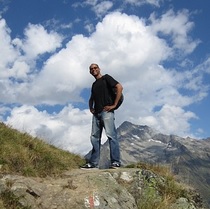 From cradle to grave, Western society teaches us to compare ourselves with others and to believe that those on top must have “it”. How else, the culture reasons, could they have succeeded? What results from this thinking? Everyone keeps climbing all over each other trying to prove how great they are. They seek to validate their own sense of self-worth within the culture. Unless you prove that you're better than someone else — that you have “it” — Western culture teaches that you aren’t validated. The cultural notion of “it” also encourages you to do everything on your own. If you need help, you obviously don’t have “it”. This notion explains why so many of us find it hard to accept service from others. Because of our cultural programming, we don’t want to appear like we don’t have “it”. "It" discourages righteous families This one cultural influence frustrates many LDS singles as they try to create families. For example, suppose you have some bad experiences with dating. OK, so maybe you don’t have to suppose. Is your normal response to give up because you think you don’t have “it”? Wired as we are by our culture, we very easily think, If we weren’t born with whatever wonderful something it is that we believe we need to have to succeed, then why even try? We also compare ourselves with others or some hypothetical ideal and think we don’t measure up. Often in such instances we quit without ever really trying. It’s obvious you don’t have “it” if you aren’t as wonderful as someone else. So why torture yourself by proving what you fear, that you're unable to have your righteous desires? After all, you just don’t have “it”. Turn the tide with the truth  It doesn’t have to be that way. Replace the idea of “it” with the idea that talent can be learned. You can then see service from others as an opportunity to learn something new and to improve upon yourself. That makes it easier to embrace. No talent of any kind is innate. Learning line upon line is part of the experience we came to mortality to have. Even people who think that they aren't “math people” can learn math. I saw it all the time in a former life as a night school instructor. Talent can be learned. And because it is learned, you need to see failure as a chance to improve yourself. Remember that your focus determines your reality. For example, it’s easy to think you're somehow defective because you can’t get a date. And as long as you focus on how “defective” you are, your reality will feel to confirm just that. But when you focus instead on your efforts, your failure to get a date doesn’t mean something is wrong with you but rather with your effort. Ask yourself, “Why was it exactly that my effort to get a date failed?” and then keep following that trail until you find real answers. You are already accepted  Ultimately the Savior has already accepted you. He would not have suffered all He did if you were not worth redeeming. That means you don’t have to prove or validate yourself or even compare yourself with anyone else. You are already accepted. His acceptance is the only one that matters. When you accept that truth, you free yourself from feeling you must have a significant other in order to be accepted. You can more easily be real in your interactions with other people. You don’t have to pretend you're something you really aren’t. That freedom makes life so much more enjoyable. If you don’t feel that freedom now, then pray for it. The Lord will guide you to embrace your true worth. After all, He knows that you're worth it. 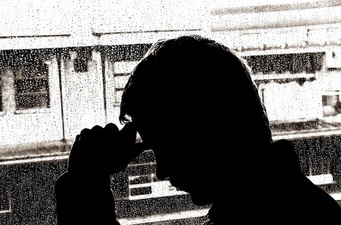 LDS singles often confront challenges of identity. Different cultural aspects have influenced us in adopting habitual ways of thinking. That includes how we identify ourselves. We all respond to those habitual perspectives. And it can be very easy to get discouraged or depressed when your efforts to improve do not yield the results you want. But you don’t need to feel that way. Let’s address some identity issues that LDS singles face. You are not your job  Some singles filter their interactions with other singles based on their occupations. If you are unemployed, you might find some don’t want to befriend you. After all, what good are you if you can’t bring home the bacon? Acting on this attitude sends a clear message to those who struggle financially that they must have a very successful occupation in order to be loved. Many of these people feel very unloved. Of course, you should do what you can to improve your employment situation. But you should also improve the way you think. Yes, people typically prefer interactions with occupationally attractive people. But they are also hardwired to respond to generosity and cheerfulness. My first job? Busboy in a Mexican restaurant. What does that say about who I really am? Not a whole lot. How I approached that job, however, says a ton. Never being late, always doing what I was asked, and always being attentive speaks volumes about who I really am. You are not your job (or your lack of one). You are the qualities you choose to exhibit through your actions. You are not your body  How your body is shaped or groomed is not really who you are. Yet many singles filter their interactions based on physical appearance. Acting on this attitude sends a clear message that you must be attractive in order to be loved. And many “less attractive” people feel very unloved. Of course, you should do what you can to improve your appearance. But you should also improve the way you think. Yes, people typically prefer interactions with physically attractive people. But they're also hardwired to respond to people who project generosity and cheerfulness. If all you know about me is the way I look, you won’t think very much of me. I’m okay with that. It puts me in good company (see Isaiah 53:2-3). But it doesn’t say a thing about who I really am. Can you tell the sacrifices I have made to be true to the restored gospel by the way I look? Not really. The story of my sacrifice radiates my desire to be true and faithful regardless of how my life does (or doesn’t) work out. That speaks volumes about who I really am. You are not your body. You are the energy that you choose to radiate to those around you. You are not your marital status  Many Latter-day Saints (both single and married) unknowingly grant acceptance and validation to those who have experienced the subcultural rite of passage we call temple marriage. Everyone else is therefore less or deficient. Acting on this attitude sends a clear message to LDS singles that they must be married in order to be loved. And many singles who buy into this belief feel very unloved. Of course, you should do what you can to improve your situation. But you should also improve the way you think. Yes, even people in the Church will not always accept you. But they're also people, and like most people they're inclined to respond to generosity and cheerfulness. You create meaningful life through contribution. The marriage ceremony doesn’t change who you are fundamentally. But whether you contribute positive attributes and energy into the lives of others will. You are not your marital status. You are the contributions that you make to those around you. Enjoy the richness of life You will enjoy your life more when you reject the faulty idea you're your circumstances and truly embrace the correct idea that you're a child of God. Many of us don't know what that really means, due in part to the message our actions send.
Many times our actions portray apathy or exclusion rather than love and inclusion. When you truly desire to follow the Master, you reject the herd mentality and seek to satisfy the needs of others. You create a rich life through meaningful contribution. You are not your circumstances. If you think you are, you need to reformat and reboot yourself. You are a child of God with infinite worth and potential. Start seeing that in yourself, and then others will be able to see that more clearly in you as well. |
Author
Howdy! I'm Lance, host of Joy in the Journey Radio. I've been blogging about LDS singles life since 2012, and since 2018 I've been producing a weekly Internet radio show and podcast to help LDS singles have more joy in their journey and bring all Latter-day Saints together. Let's engage a conversation that will increase the faith of LDS singles and bring singles and marrieds together in a true unity of the faith.
Comment
Joy in the Journey Radio encourages the free discussion of ideas but reserves the right to remove and/or block comments which do not conform to LDS standards.
Donate
Joy in the Journey Radio offers many free resources to help LDS singles everywhere, but it certainly isn't free! Help Joy in the Journey Radio in its mission to improve the lives of LDS singles by donating today.
Posts by Month
December 2022
Categories
All
|
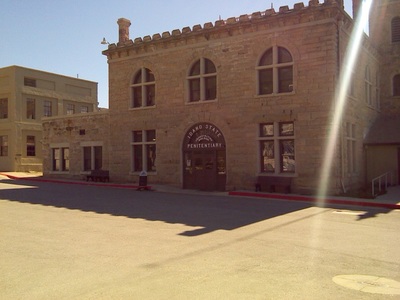
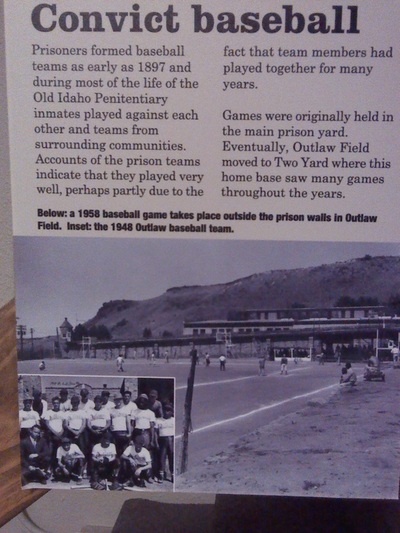



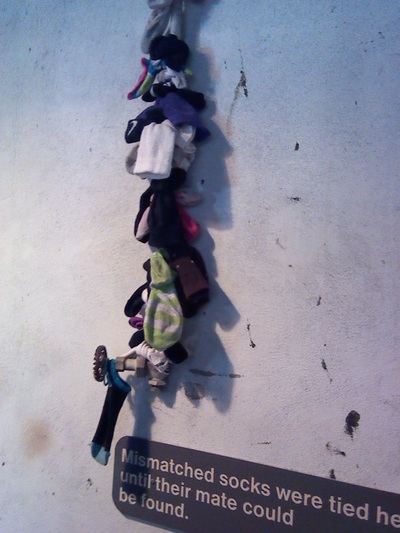

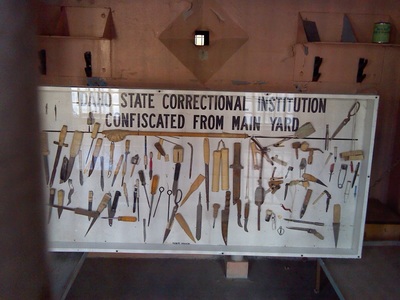


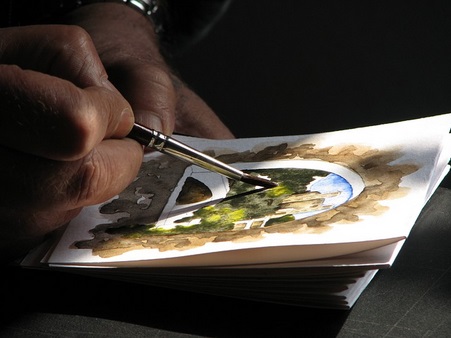

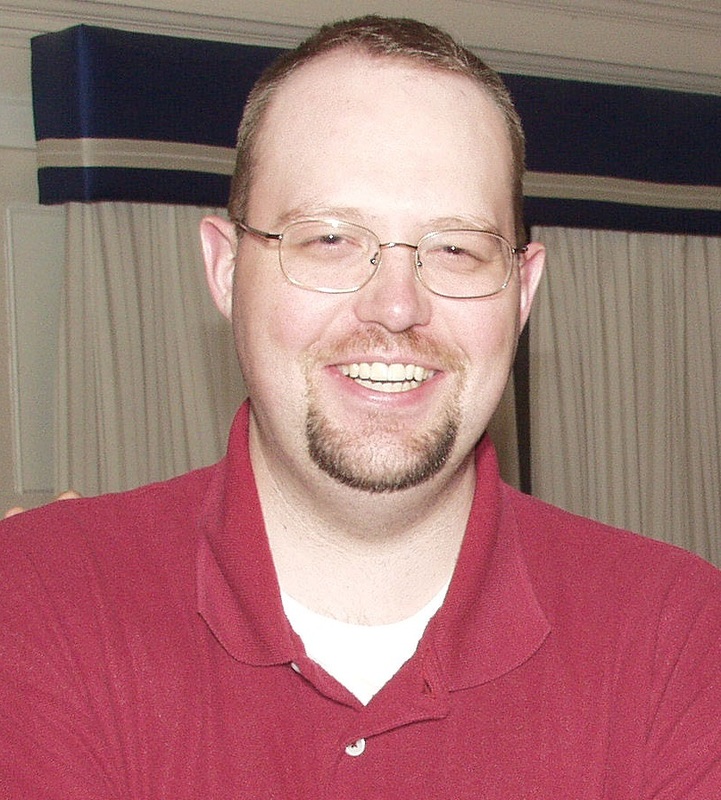
 RSS Feed
RSS Feed